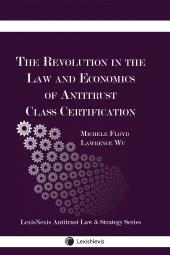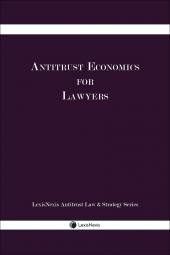The Revolution in the Law and Economics of Antitrust Class Certification
Select a format
 International Order Inquiry
International Order Inquiry
Select subscription type
Terms & conditions
Subscribers receive the product(s) listed on the Order Form and any Updates made available during the annual subscription period. Shipping and handling fees are not included in the annual price.
Subscribers are advised of the number of Updates that were made to the particular publication the prior year. The number of Updates may vary due to developments in the law and other publishing issues, but subscribers may use this as a rough estimate of future shipments. Subscribers may call Customer Support at 800-833-9844 for additional information.
Subscribers may cancel this subscription by: calling Customer Support at 800-833-9844; emailing customer.support@lexisnexis.com; or returning the invoice marked "CANCEL".
If subscribers cancel within 30 days after the product is ordered or received and return the product at their expense, then they will receive a full credit of the price for the annual subscription.
If subscribers cancel between 31 and 60 days after the invoice date and return the product at their expense, then they will receive a 5/6th credit of the price for the annual subscription. No credit will be given for cancellations more than 60 days after the invoice date. To receive any credit, subscriber must return all product(s) shipped during the year at their expense within the applicable cancellation period listed above.
The total price includes the product(s) listed in the Order Form and any Updates for a limited period (minimum period of 30 days) after the order is placed ("Order Window"). Shipping and handling fees are not included in the grand total price.
All shipments may be returned, at subscribers' expense, for full credit of the Price within 30 days of receipt.
Shipments may not be returned, and no credits will be issued, more than 30 days after receipt.
After the Order Window, subscribers will receive notice of Updates along with the then-current grand total price and order process as Updates become available. Subscribers will only be shipped those Updates they specifically request.
Product description
View a sample of this title using the ReadNow feature
For the rational study of the law the black-letter man may be the man of the present, but the man of the future is the man of statistics and the master of economics.
Oliver Wendell Holmes, Jr.
After decades of stagnation, there has been a rapid and dramatic change in the way courts are reviewing and deciding antitrust class actions. The applicable standards have changed. Along with that, there has been a change in the way judges, lawyers, and economists think about the issues surrounding the certification of antitrust classes. These developments have changed the arguments made as well as the types of evidence presented in court. The result can change who wins and who loses, which raises practical and pressing issues for all involved …
There has been a revolution in the way courts approach antitrust class certification. Courts now demand more rigorous evidence from both plaintiffs and defendants at the class certification stage…The Revolution in the Law and Economics of Antitrust Class Certification offers guidance on this aspect of class certification, as it relates to antitrust, through an examination of a handful of antitrust cases that have proven instrumental in re-shaping the law. It provides the general analyses involved in determining whether a class can be certified, where the determination of who is appropriately included in the class of those who have been harmed can turn an ordinary claim for damages into a multi-million dollar, bet-the-company litigation, and where, on the other hand, an unsuccessful motion often ends the litigation.
Revolution in the Law and Economics explores why antitrust law is so important in today's economy; why antitrust class action lawsuits are brought; how they are decided, and the legal and economic issues that have changed the way the courts approach them; why and how economic analysis has become an essential part of antitrust law; and how antitrust law has changed as a result of the analyses and evidence that economists have brought to the courtroom.
Revolution in the Law and Economics looks at the underlying legal and economic concepts and principles underlying these decisions, both tried and true, and tried and failed. This book is a discussion, and it is intentionally directed toward a broad audience: practicing attorneys who want to know how and why antitrust class actions are litigated very differently today than they were for decades; general counsel and in-house attorneys who want to know what their case will look like if they are sued; judges who are looking for a brief on how antitrust class action law has changed over the past decades; executives and policymakers who may be concerned about the business and public policy implications of class actions; executives and policymakers in Europe and other countries who are considering enacting class action laws; economists who want to know how their economic theories and empirical techniques are having an impact on decisions in the courtroom; and anyone who gets a settlement check or a notice of an antitrust class action who wonders what happened before the check was cut. Revolution in the Law… serves as a lesson in history and an examination of the way change takes place in the courts. It looks at the trends that precipitated the change and the rapid rate of change once one judge spoke up.
The 2017 edition ISBN is 9781522109266.
eBooks, CDs, downloadable content, and software purchases are noncancelable, nonrefundable and nonreturnable. Click here for more information about LexisNexis eBooks. The eBook versions of this title may feature links to Lexis+® for further legal research options. A valid subscription to Lexis+® is required to access this content.
Table of contents
Chapter 1. Shifting Sands: Changing Standards of Proof for Class Certification in Antitrust Class Actions
Chapter 2. Old School Rules and Requirements: When Class Certification Was Easier
Chapter 3. Tying in the Bogosian Shortcut
Chapter 4. Hydrogen Peroxide and the Need for Rigorous Analysis: A Body of Proof or Rigor Mortis?
Chapter 5. The Catalysts of Change
Chapter 6. The Demand for Economics in the Courts
Chapter 7. Where's the Money?
Chapter 8. Time Travel: Assessing the Merits of the Case in the Context of Class Certification
Chapter 9. How Heavy is Your Funky Chicken? Econometrics and the Mechanics of Regression Analysis
Chapter 10. Shoes, Bricks, and Finding a Place for Indirect Purchasers to Stand
Chapter 11. The Buck Stops Here
Chapter 12. No More Junk Science: Challenging Experts at the Class Certification Stage
Chapter 13. When the (Diamond) Dust Settles
Chapter 14. Evolution and Revolution
Bibliography
 Lexis Nexis
Lexis Nexis 
